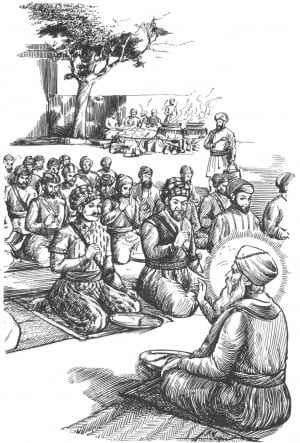Guru Amar Das and King Akbar
Akbar was a famous king of India. He was a kind and good king and respected the Sikh Gurus for their sensible practises and their fair and just teachings. In the year 1569, Akbar came to the Punjab and wanted to see the Guru.
So he sent a message to Guru Amar Das ji that he was coming to visit him. The Sikhs were very happy at the news. Some Sikhs thought that special arrangements should be made to welcome the king. But the Guru said, "Akbar is as much a human being as others are. The Guru's place is open to all. The king and his subjects, the Hindus and the Muslims, the rich and the poor are all equal here. So Akbar will be welcomed like all other visitors to the Guru's place and special arrangements need not be made."
- "Caste has no power in the next world; Only the humble are exalted there. It is only the good who are honoured for good acts." (Guru Nanak (SGGS p469))
The king, along with the Rajah of Haripur, arrived in Goindwal where the Guru lived. The Guru and a few Sikhs received them warmly. They were shown round the place. Akbar was interested to know how the Guru's Langar was run. Simple food was served to all in the Guru's Langar. It remained open day and night.
Travellers, beggars, and strangers, as well as the followers of the Guru, were all served with food. Whatever was left was thrown to the cattle and birds so that nothing was wasted. The Guru had given an order that all persons coming to visit his place must have their food in the Langar (when hungry). There they were to sit in rows (Pangat) as equals and were to be served simple food in turn. Akbar and the Rajah of Haripur took their meals in the Guru's Langar. They sat among the common people in a row as the Sikhs served them food. They enjoyed the simple food and were very happy. Akbar liked the working of the Guru's Langar very much.
Conversation with the Guru
He had this memorable conversation with Guru Amar Das Ji:
Akbar was wonderstruck to see a unique and rare type of radiance, glow, penetrating beauty on the face of the very aged Guru. Wonderstruck with that overwhelming glow on the radiant face of the Guru, astonished Akbar respectfully asked a simple question from the esteemed Guru. He said, “The best of ‘Hakims’ accompany me wherever I go and they assist in the preparation of my food with the best of tonics and nutritions. I am not even half the age as yours. What food do you take, Sir, with which your face glows and shines like a sun?” The Great Guru politely replied, “O Emperor, I take the same simple food which you have just taken in the common kitchen (Langar) here. What you notice on my face is nothing else than The Sweet and Sacred Remembrance of Allah.”
Before leaving, Akbar said to the Guru,
- "I like Guru Nanak's religion very much and I respect you for your teachings. I want to make a grant of land for running the Langar. Would you mind it!".
The Guru replied,
- "Dear Akbar, I am very glad you like the path of Baba Nanak. I am also grateful to you for your offer of a grant of land for the Langar, but I am sorry I cannot accept it because the Guru likes all to work hard to earn (Kirt Karni) and to share their honest earnings (Wand Chakna) with others, by giving something to the Langar from their honest earnings to help others.
- As such, the Guru's langar is the people's (Sangat's) Langar and it must be run on people's free gifts and not on a royal grant. That is why all share equally in the Guru's Langar and no one is looked upon as an outsider. In the Guru's Langar, each gives as much as we can spare and takes as much as he/she needs. Here, there is no difference between kings and beggars. All sit together; and eat simple food served with loving care." Akbar liked the Guru's idea very much.
Akbar had made up his mind to do something for the house of Nanak. He presented the land of Amritsar to Bhani the daughter of Guru Amar Das as gift in her marriage.
- One who works for what he eats, and gives some of what he has
- O Nanak, he knows the Path.(1) (Guru Granth Sahib – (SGGS p1245))
References
- The conversations with Akbar titled Noor-E-ilahi [1] Main topic Eternal Glory of Guru Amar Das Ji
- This article with thanks to tuhitu: The stories of our ancestors make the good children. and book
- Stories from Sikh History Book 2, Hemkunt Press, A-78 Naraina Ind. Area, Phase-1, New Delhi-110028

